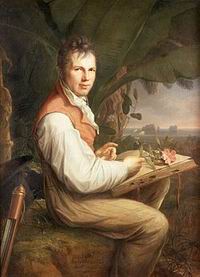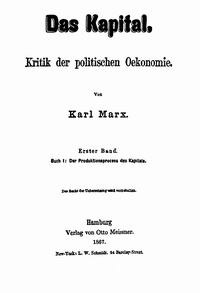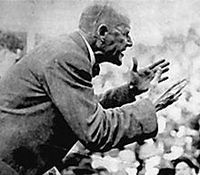Seeds of Fire: A People’s Chronology
Recalling events that happened on this day in history.
Memories of struggle, resistance and persistence.
Compiled by Ulli Diemer
|
September 14, 1769
|

|
|
Birth of Alexander von Humboldt (1769-1859), naturalist, scientist, geographer, opponent of slavery, philosopher.
|
|
September 14, 1867
|

|
Publication of the first volume of Das Kapital, by Karl Marx.
Karl Korsch writes: “Marx’s book on capital ... owes its tremendous and enduring impact to the fact that it grasps and articulates, at a turning point of history, the full implications of the new force breaking in upon the old forms of life. All the economic, political, and social questions, upon which the analysis in Marx’s Capital theoretically devolves, are today world-shaking practical issues, over which the real-life struggle between great social forces, between states and classes, rages in every corner of the earth. Karl Marx proved himself to posterity to be the great forward-looking thinker of his age, in as much as he comprehended early on how decisive these questions would be for the approaching world-historical crisis. But even as great a thinker as Marx could not have grasped these questions theoretically and incorporated them in his work, had they not already been posed, in some form or another, as actual problems in the real life of his own epoch.”
Marshall Berman had this to say about Capital in his book Adventures in Marxism:
“What makes Capital so exciting is that, more than anything else Marx wrote, it brings to life his vision of modern life as a totality. This vision is spread out on an immense canvas: more than a thousand pages in the first volume alone; hundreds of characters – shopkeepers and sharecroppers, miners and millowners, poets and publicists, doctors and divines, philosophers and politicians, the world-famous and the anonymous – speaking in their own voices. The amazing multiplicity of real voices that Marx brings forth, and the skill with which he propels and deploys them, carry us back to the glorious days of the nineteenth-century novel, back to Lost Illusions and Bleak House and War and Peace. Some of the most vivid characters appear for only a moment; others stay with us for long stretches and engage Marx in long passionate argument; others disappear for hundreds of pages, only to return transformed. The people in Capital have a life that will outlive capitalism itself.”
|
|
September 14, 1918
|

|
|
Socialist Eugene Debs is sentenced to 10 years in prison for opposing U.S. entry into World War One, which he characterized as a capitalist war. While in prison, he runs for President in the 1920 election and receives nearly one million votes.
|

